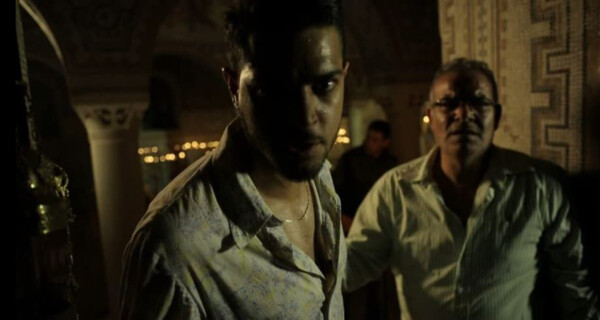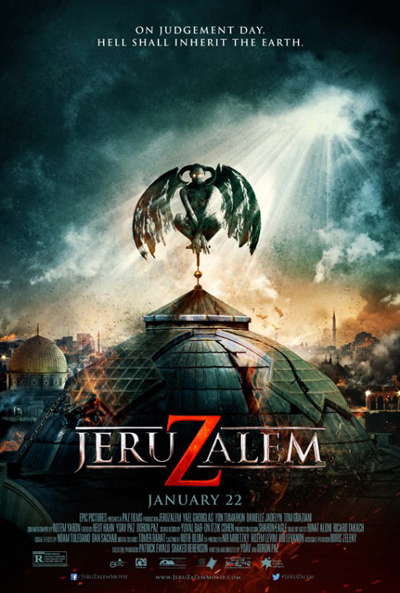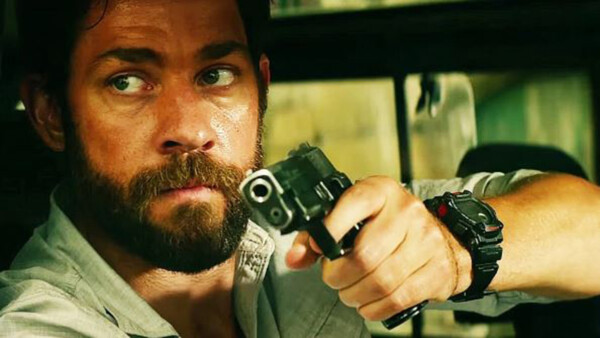Del reviews ‘JeruZalem’

Image courtesy of Epic Pictures Releasing.
“JeruZalem” Starring Yael Grobglas, Yon Tumarkin, Danielle Jadelyn and Tom Graziani. Directed by Doran and Yoav Paz as The PAZ Brothers. 94 minutes. Rated R. Netflix.
Del’s take
The found-footage film has found a home in the horror genre, resulting in classics like “REC,” “V/H/S,” “Troll Hunter” and the grandwitchy of ’em all, “The Blair Witch Project.” It also has produced some amazing clunkers. “Paranormal Entity,” “Area 407” and “Apollo 18” come to mind.
Falling somewhere in between is “JeruZalem,” an unlikely pairing of the weighty and the frothy (Judgment Day from the point of view of a teen girl’s spring break getaway). How far it leans toward “Blair Witch” or “Apollo 18” depends on the moviegoer’s charity. While some people loath found footage as a lazy director’s approach to storytelling, others appreciate its clarity of viewpoint.
I find myself bouncing between those two worldviews. I think movies like “Troll Hunter” and “Cloverfield” are masterpieces of the genre. I even liked “Apollo 18” for what it was – a space-based horror flick with limited ambitions. But some movies don’t benefit from the found-footage viewpoint and “JeruZalem” may be one of them. Third person probably would have been a perfectly acceptable storytelling vantage point, and I would not have been distracted by irrelevant technical details such as how the lead character kept her device charged throughout the apocalypse.
I’ll probably be asking myself the same question about my phone after this Korea thing blows up.

In “JeruZalem,” young Sarah Pullman (Jadelyn) is whisked away from her overprotective and Skype-stalking father (Howard Ripp) for a whirlwind tour of the old city of Jerusalem during Yom Kippur. At the Tel Aviv airport they meet good-looking Kevin Reed (Tumarkin), an antiquities student who promises to hook them up with a hostel in the old city and show them the best clubs and sights.
There, they hook up with Omar, the young hostel owner, who takes them out for a night on the old town and stakes his claim to Rachel (Kevin has already targeted Sarah). They dance the night away as dear old dad vainly tries to Skype his daughter because he has been watching the news and hears that something weird is going on in Jerusalem.
The quartet discover the city has been quarantined and Israeli troops are battling – something. They hear gunfire, explosions and screams in the distance, not to mention an unearthly growling and screeching reminiscent of the time you accidentally shut the door on the cat’s tail.
From that point “JeruZalem” becomes an escape caper with the two American girls and their vacation boyfriends struggling to get out of the old city while monstrous events unfold around them.
The story is displayed from a pair of Google Glass-like eyeglasses that belong to Sarah, and yes, I would really like to know how she kept the damn things charged through her ordeal. My new phone will maintain a charge over a couple of days’ heavy usage, but then my phone has a battery the size of a Pop Tart. Sarah’s Glass didn’t – unless the Pop Tart was hidden in her blouse pocket.
The actors carried their parts effectively and there were no gaping holes in the plot, at least none I would try to drive a truck through. Special effects were acceptable and pacing matched the plot well enough. The found-footage viewpoint was not overly distracting, although at times the integration of technologies struck me as too seamless to be believed.
If I had a substantial criticism it would be that the storytelling mechanism trivializes the subject material. Mysterious stars in the sky over Jerusalem portending a religious disaster, sinister film footage smuggled from the Vatican showing the alleged execution of a demon, and air raid sirens that warn of something far worse than incoming Palestinian rockets are all gamely revealed through the lens of a silly pair of internet-capable glasses that display a frowny face and flash “fatal error” when dropped.
It’s all in the name of fun, however, and I confess I enjoyed “JeruZalem” despite its limited flaws.
I would give the movie a B- grade for its interesting premise, decent plot and pacing, and occasional (although sparse) flashes of genuine weirdness. I mark it down for its found-footage viewpoint, which did not serve the story effectively.
I watched it on Netflix.
Del Stone Jr. is a former journalist and author.

Image courtesy of Paramount Pictures.
“13 Hours” Starring John Krasinski, Pablo Schreiber, and James Badge Dale. Directed by Michael Bay. 144 Minutes. Rated R.
Del’s take
Sorry, all you fine folk who refer to Hillary Clinton as “Hildabeast.” You were hoping “13 Hours,” the new Michael Bay docudrama about the 2012 attack on an American diplomatic compound in Benghazi, Libya, and a subsequent attack on a CIA outpost about a mile away, would be the stake driven through the heart of Clinton’s presidential campaign. Ain’t gonna happen. Clinton’s name is not uttered once in the two hour-plus presentation. You can go back to snuffling through the hog wallow for some stinky nugget to blow out of proportion so your insane (GOP candidate of choice) can have a chance in November.
The folks who take it on the chin in this compelling new movie are the American military and the State Department (Clinton was secretary of state at the time, but again, her name is never mentioned), both of whom are portrayed as either absent or ineffective. It is a harrowing experience, blessedly devoid of conspiracy theories or jingoistic flag-waving.
People actually clapped as the credits rolled.
The story is about an American GRS contractor named Jack Silva (John Krasinski) who joins a team of former SEALS and Delta Force soldiers charged with the protection of a CIA station in Benghazi. Meanwhile, about a mile away, the American ambassador to Libya visits a compound on the anniversary of 9/11. Before the night is over Islamic militants attack the compound. The GRS soldiers want to help defend it, but their CIA boss (David Costabile) refuses to let them go. Finally, they take matters into their own hands and fight their way into the compound, but it is too late for the ambassador, who has died in a fire set by the attackers. The soldiers then fight their way back to the CIA compound, which comes under repeated attack as they plead for U.S. military intervention. But none ever comes.
The La-Z-Boy quarterbacks who get high from huffing their own gasses love to blame Clinton for the debacle, but the movie suggests it was simple bureaucratic inertia, not a Hildabeast dislike of the military, that resulted in the tragedy. The hot-air snogglers won’t accept that, but there you go. If Adolf Hitler had been secretary of state, they would have blamed Obama.
Acting is quite good. Krasinski sheds his goofy “Office” persona for a serious role and carries it with surprising gravity. And, ladies (and some of the gentlemen) will notice he’s nicely ripped for the part. The others are all equally effective, and as a viewer you will forget they are actors and empathize with them as human beings.
As for the movie itself, Bay recuses himself from his usual absurd, over-the-top grandiosity and turns in a tense, tightly focused narrative that avoids, for the most part, the kind excessive nationalistic pomposity you saw in “Pearl Harbor.”
I’m not a fan of Hillary Clinton and have no intention of voting for her, unless confronted with a GOP candidate so utterly dangerous I have no choice but to vote against him. But to hold her accountable for what happened at Benghazi is ridiculous – a million miles of red tape and ten thousand GS-14s stood between her and Libya.
This movie says as much, and if some of the Hillary haters don’t get that, well, they deserve whatever nutbag they elect.
I rate this movie a solid B, possibly a B+. See it in a movie theater.

Mladen’s take
There was a couple of old timers behind me and a couple of middle agers in front of me while I stood in line to buy a ticket to see “13 Hours.” The old timers and the middle agers were acquainted. They chatted for a moment.
“What are you seeing?” asked one of the middle agers.
“Benghazi,” responded an old timer.
“Benghazi,” not “13 Hours.” No doubt the couple behind me watches Fox News and Listens to Limbaugh because they weren’t at the theater for entertainment. They were at the theater on a mission. That mission, I suspect, was to reinforce in their minds that Hillary Rodham Clinton, Democrat running for president, and Obama, Democrat in the White House, abandoned U.S. patriots to a mob of Libyan terrorists more than three years ago. Four Americans died in the ensuing two-day, on-again, off-again gun battle.
I also assume the couple standing behind me was disappointed. Del is correct. “13 Hours” points the finger of fault at, principally, the CIA station chief in Benghazi. He refused to let the mercenaries (i.e. former Special Operations Forces troops) hired to protect the poorly disguised CIA station in Benghazi assist the people trapped in the American consulate under attack just one mile down road.
Where facts stand and were “13 Hours” fills gaps when facts are unknown, I don’t know, but, unlike Del, I hesitate treating any product from Hollywood as accurate history. “13 Hours” is a decent film, nothing more. Generally, the characters are likable and the action intimate. This movie isn’t about remote control warfare from standoff distances. Here, bullets hit with a thunk and mortar shrapnel cuts through muscle and bone. The violence is the popping of small- and medium-caliber ammunition and the whir of RPGs.
Bay, the director, tries to infuse humanity into the mercenaries contracted to protect CIA personnel by portraying them as fathers and friends, but it was ineffective. They were in Libya by choice, rather than orders. That made them tough to appreciate as family men.
The film has its moments, particularly toward the end, of flag-waving sentimentalism, but it’s not putrid. And, it’s at the end that Bay was the most daring. “13 Hours” ends with the camera panning the battlefield outside the CIA compound. There, amid the torn white fabric, now stained red, of what once might have been a plant hothouse or animal pen with a cloth roof to protect against the sun, Libyan women and children wept at the corpses of their loved ones.
“13 Hours” is a B and worth seeing in the theater, but, be warned, the last half is bloody.
Mladen Rudman is a former journalist and technical editor. Del Stone Jr. is a former journalist and author.